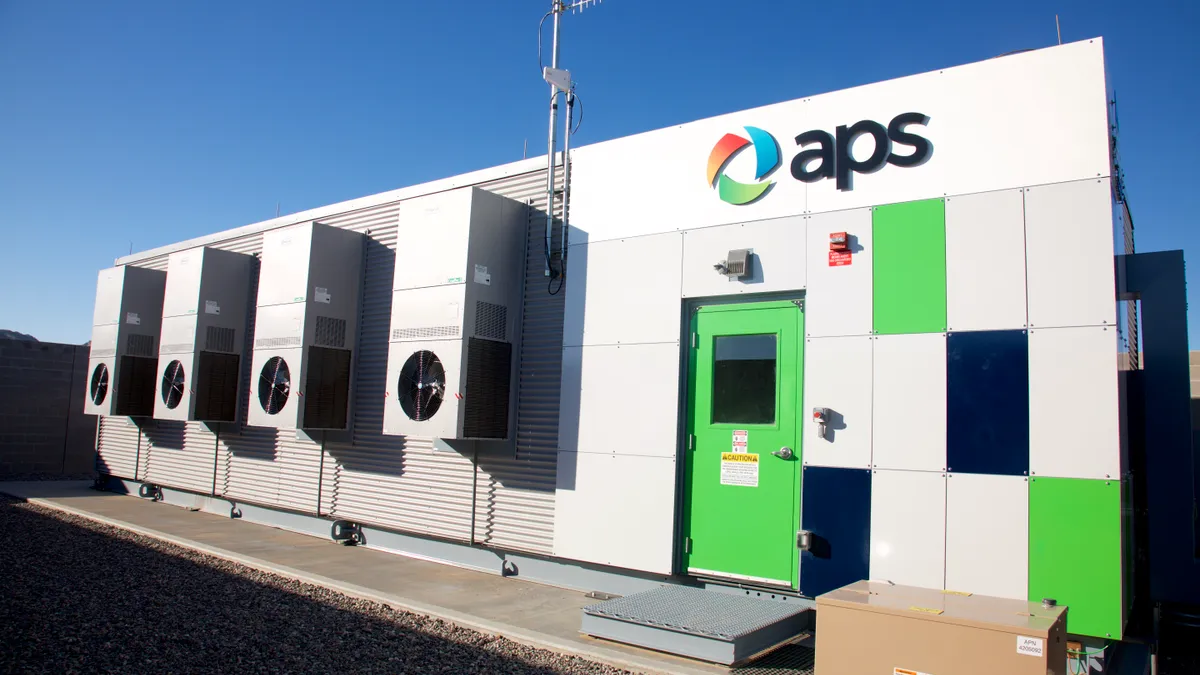Dive Brief:
-
Retroactive ratemaking violates the state constitution, counsel for APS's parent corporation told Arizona Corporation (ACC) Ccommission Chairman Robert Burns and Commissioner Sandra D. Kennedy in a June 17 letter. Burns had previously called to declare the company's rate plans "interim" and Kennedy had called to reopen the commission's 2017 rate case decision due to questions about the utility's customer education and outreach program.
-
Commissioners also submitted proposals on Wednesday to the ACC's docket offering a number of suggestions in the company's pending rate case to aid residential ratepayers, including opening Arizona markets to retail electric competition, performance-based rate designs, and abandoning time-of-use rates while reinstating flat rates.
- "We’re disappointed that the commission failed to address the company's outreach and education program, which remains problematic," Diane Brown, executive director of Arizona Public Interest Research Group's (PIRG) Education Fund, told Utility Dive.
Dive Insight:
"Certainly, APS failed to develop and implement their [Customer Outreach and Education Program (COEP)] in a manner beneficial for its ratepayers," Brown wrote in a June 17 letter submitted to the commission.
"However, Commission Staff and Commissioners also bear responsibility for failing to ensure APS had and was executing a solid plan. Neither APS nor Commission Staff took input from advocates seriously," Brown continued.
Commission consultant Barbara Alexander found a number of deficiencies in APS's customer education and outreach program when compared with "best practices" developed by Southern California Edison and adapted by other California investor-owned utilities.
Burns had called the ACC staff report 'scathing' and suggested APS may have over-earned millions of dollars due in part to its possibly inadequate education and outreach program. Kennedy called for the commission to revisit its 2017 decision approving APS’s current rates.
"APS disputes that it has been or is overearning either as a matter of fact or as a matter of law, or that its revenues are too high due to perceived shortcomings in its Customer Outreach Education Program," Melissa M. Krueger, associate general counsel for Pinnacle West Capital Corporation told Burns and Kennedy in the company’s response to the commissioners' letters regarding the consultant’s report criticizing APS’s customer outreach and education program.
APS is the primary subsidiary of holding company Pinnacle West Capital. APS told Utility Dive the company could not yet respond to requests for comments.
Krueger reminded Burns and Kennedy that during a June 2019 open meeting, commission counsel had advised commissioners that going back to prior rates or making rates interim and subject to ratepayer refunds is retroactive ratemaking and violates the Arizona Constitution.
Commissioners have submitted a number of recommendations in the current rate case for APS's rates that would go into effect December 1.
"I am proposing the reinstatement of a flat rate that customers can opt-into to free themselves from complicated time-of-use rates, as well as some other ideas that can help APS follow-through on its commitment to helping customers save on energy bills," Commissioner Lea Márquez Peterson wrote June 17.
Márquez Peterson also suggested APS deploy smart thermostats at no cost to customers.
"Providing smart thermostats would provide both short-term and long-term relief to APS’s customers," Brown told Utility Dive.
Even if individual customers do not choose to take advantage of smart thermostats or other efficiency tools, "ratepayers would reap the benefits of less energy being used which would result in lower capital expenditures," Brown said.
Commission Boyd Dunn raised the idea of performance-based rate design.
"I believe this approach would be an effective way to address Arizona Public Service Company’s ... continuing disregard for customer outreach, education, and satisfaction," Dunn wrote in his submission to the commission’s docket.
"We support performance-based rate designs," Brown told Utility Dive.
"However, like any policy, how it’s developed, implemented and enforced are keys to its success," Brown said.
Commissioner Justin Olson agreed with Chairman Burns’s view of Alexander's report as 'scathing', writing in his submission to the commission’s docket that it "revealed not only a flawed COEP, but more fundamentally, a flawed rate system."
"I believe retail electric competition is an appropriate solution to the challenges ratepayers are facing with APS," Olson wrote.
Arizona PIRG Education Fund in a June 17 submission to the dockets on the COEP and current rate case offered a number of "next steps" for the commission, including directing commission staff to participate in APS’s consumer work group, requiring APS to submit a comprehensive and updated COEP by September 30 that would replace the one approved in 2017, requiring APS to establish a 24-7 call center for customer support, and signaling to the company it should not have a return on equity that exceeds 10%. The group also called for the commission to raise questions and publicly share the commission's perspective to let APS ratepayers and Arizonans know the commission is paying attention.
Both Chairman Burns and Commissioner Boyd Dunn filed notices that their campaigns for the Arizona Corporation Commission had received donations from APS’s parent, Pinnacle West Capital Corporation.
The Arizona Corporation Commission will resume discussions at its July 14-15 Open Meeting.














